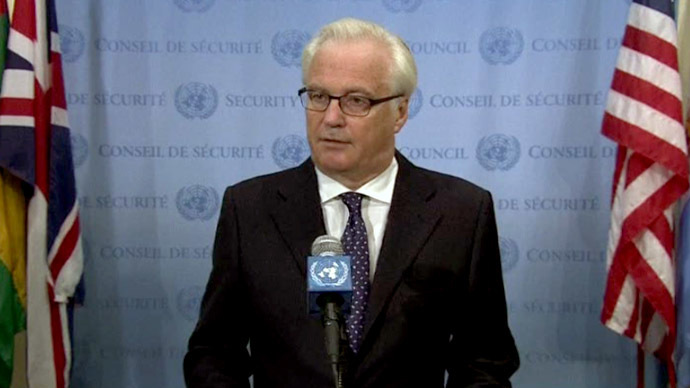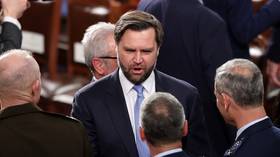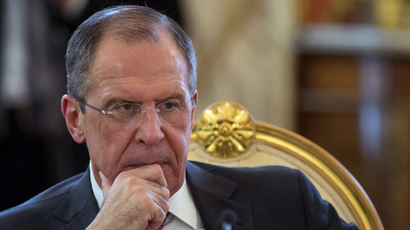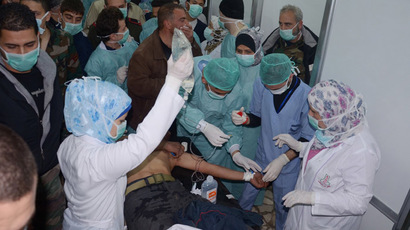Russia’s UN envoy: Moscow ‘not blocking’ UN access to Syria, Western ‘propaganda storm’ misleading

Russia’s envoy to the UN has refuted US accusations that Moscow is blocking UN access to Syria “to investigate any and all credible allegations,” claiming the charge is “misleading.” He also urged Western partners to refrain from a “propaganda storm.”
Speaking from the UN headquarters in New York, Russian Ambassador
Vitaly Churkin told reporters that Russia had done everything
within its power to facilitate a Syrian government request that
the UN investigate the deployment of chemical weapons in a
government-controlled suburb of Aleppo on March 19.
“It was not through the fault of ours that the Syrian
government was presented with formulas for that investigation –
Iraq time formulas – which of course were impossible to
accept,” Churkin stated.
The ambassador also stressed Russia’s role in helping arrange an
invitation for members of the UN chemical arms team to visit
Damascus.
On Wednesday, the head of the UN investigation team to probe the
alleged use of Chemical Weapons in Syria, Ake Sellstromand, and
UN disarmament chief Angela Kane accepted an invitation from the
Syrian government to discuss the investigation of alleged
chemical attacks in Syria.
Meanwhile, Churkin further refuted the US State Department’s
claim that Russia was blocking a UN Security Council effort to
allow UN access into Syria.
“It’s not for the Security Council to allow access. It’s for
the Syrian government to agree on that, with the [United Nations]
Secretariat. And this is exactly what they’ve been trying to
achieve, having invited the UN chemical weapons inspectors to
Syria way back in March.”
The envoy further stressed the need to only look into
“credible allegations,” as Western states had been
attempting to create “the maximum number of allegations with
minimal credibility in an effort, one might think, to create
maximum problems for arranging such investigations.”
He further attempted to silence western diplomatic chatter, which
claimed that Russia had blocked a draft UN Security Council
resolution this week to prevent a UN chemical weapons
investigation team from conducting an “objective” inquiry
in Syria.
It is “wrong to describe Russia as the sole voice” in the
discussion on Syria, Churkin went on to say. He added that his
Chinese colleague, Ambassador Li Baodong, “entirely
shared” his position.
According to Churkin, this includes the two countries’ belief
that the language used in the G8 statement on the chemical
weapons investigation should be made into a resolution.
“What we pointed out is that a declaration of the G8 is an
important political document of course – but it is not
necessarily meant to be put in the form of a resolution,” he
said.
It is “clear” from the text of the G8 statement, that
there should first be an investigation, and then the results of
the investigation should go to the Security Council for
assessment, Churkin stressed.
However, some Western nations – the UK in particular – “tried
to put the cart before the horse once again,” Churkin said,
adding that such notions were “completely unreasonable and
contrary to the G8 declaration they were referring to.”
The Russian envoy also noted what he deemed to be a somewhat
inadequate response by several Western countries following an
announcement that Russia handed over its thorough investigation
of the Aleppo incident to the UN.
“Even before having a chance to look at this very serious and
substantive 80-page investigation analysis,” some senior
Western diplomats made “remarks…repeating this naïve story
they came up from the outset...that it was the government itself
who was shooting but missed the target and killed its own
people,” Churkin said.
After the visit of two senior UN representatives to Damascus, he
said “it makes no sense, if you’re interested in good results,
to create this kind of a small propaganda storm in a glass of
water” and keep on holding onto those “fantastic
scenarios.”
The envoy reiterated that the Russian inquiry makes it
“absolutely clear that both the projectile and the chemical
[used in March 19 Aleppo incident] were produced in a way, which
rules out…production by the Syrian government” and
“conclusively shows” that the chemical weapons were “in
fact…used by the opposition.”














